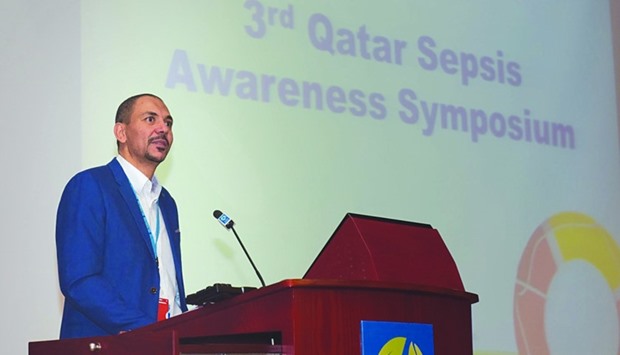Sepsis is a life-threatening condition that arises when the body's response to an infection damages its own tissues and organs and if not recognised early and treated promptly, can lead to shock, multiple organ failure and death.
The programme, to be piloted in several HMC facilities over the coming months, supports Qatar’s National Vision of providing high quality patient care through the establishment of safety systems, utilising high reliability patient-care teams and best practice models.
Dr Ibrahim Mohamed Fawzy, director, Medical Intensive Care Unit and deputy medical director, Ambulance Service at HMC, stated that the Critical Care Centre has developed a programme to reduce the incidence and impact of sepsis using tried and tested guidelines for managing the condition. “Sepsis is the tenth leading cause of death in industrialised countries, and the leading cause of death in the intensive care unit. It can be devastating to patients and their families and represents a major burden on healthcare systems.”
“We have taken a proactive approach to dealing with this serious condition and established a multidisciplinary team responsible for developing a programme that will provide a standardised method for the early detection and treatment of sepsis.
“This programme is designed to provide a safety net system to prevent these patients from experiencing the complications of sepsis, such as end-organ failure and septic shock,” Dr Fawzy stated.
HMC’s Sepsis Programme team organised an annual multi-disciplinary symposium for healthcare professionals involved in the care of patients with sepsis. The day-long symposium featured local and international experts who shared international best practice approaches to sepsis care.
“Our symposium focused on teaching simple steps that can be implemented to reduce the condition’s potentially devastating effects. One of our top priorities was to ensure that staff, and also the public, are able to recognise the earliest signs of sepsis in order to provide fast and effective treatment,” said Dr Ahmed Labib, senior consultant intensivist and anaesthetist and HMC’s Sepsis Programme working group chair, Medical Intensive Care Unit, Hamad General Hospital.
According to Dr Labib, everyone should learn about the causes of sepsis and take simple precautionary steps to protect themselves from developing the condition. These include practising proper hand hygiene and avoiding unnecessary hospital visits when they have an infection.

Dr Ahmed Labib speaking at the symposium.
Hamad Medical Corporation (HMC) has launched a new sepsis programme to benefit patients, across all HMC facilities, who have been diagnosed with sepsis. The initiative will ensure that HMC continues to provide reliable and standardised care to these patients.
